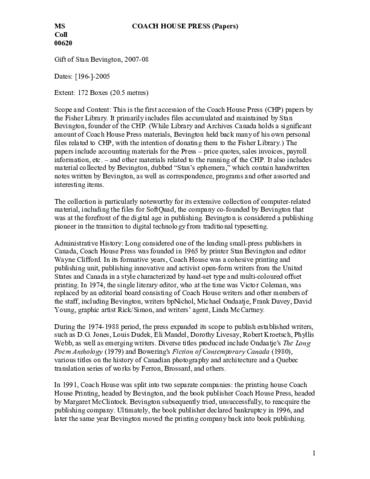Identity area
Reference code
Title
Date(s)
- [196-]-2005 (Creation)
Level of description
Extent and medium
172 Boxes (20.5 metres)
Context area
Name of creator
Administrative history
Long considered one of the leading small-press publishers in Canada, Coach House Press was founded in 1965 by printer Stan Bevington and editor Wayne Clifford. In its formative years, Coach House was a cohesive printing and publishing unit, publishing innovative and activist open-form writers from the United States and Canada in a style characterized by hand-set type and multi-coloured offset printing. In 1974, the single literary editor, who at the time was Victor Coleman, was replaced by an editorial board consisting of Coach House writers and other members of the staff, including Bevington, writers bpNichol, Michael Ondaatje, Frank Davey, David Young, graphic artist Rick/Simon, and writers’ agent, Linda McCartney.
During the 1974-1988 period, the press expanded its scope to publish established writers, such as D.G. Jones, Louis Dudek, Eli Mandel, Dorothy Livesay, Robert Kroetsch, Phyllis Webb, as well as emerging writers. Diverse titles produced include Ondaatje's The Long Poem Anthology
(1979) and Bowering's Fiction of Contemporary Canada (1980), various titles on the history of Canadian photography and architecture and a Quebec translation series of works by Ferron, Brossard, and others. In 1991, Coach House was split into two separate companies: the printing house Coach House Printing, headed by Bevington, and the book publisher Coach House Press, headed by Margaret McClintock. Bevington subsequently tried, unsuccessfully, to reacquire the publishing company. Ultimately, the book publisher declared bankruptcy in 1996, and later the same year Bevington moved the printing company back into book publishing.
The reputation of the new Coach House has been growing steadily since its rebirth in 1997, but it skyrocketed with the publication of Christian Bök’s Eunoia. This work of experimental poetry won the Canadian Griffin Poetry Prize in 2002 and has sold over 19,000 copies. Coach House books have been the recipients of dozens of other awards and nominations, including the Governor General’s Award, the Toronto Book Award, the Commonwealth Writers’ Prize, the Lambda Book Award, the Books in Canada/Amazon.ca First Novel Award and the Trillium Book Award. In 2008, Coach
House was awarded the Province of Ontario’s inaugural Premier’s Award for Excellence in the Arts for Arts Organizations. Coach House has been at the centre of a number of innovations in the use of digital technology in publishing and printing, from computerized phototypesetting to desktop publishing. Notably, the pioneering SGML/XML company, SoftQuad, was founded by Coach House’s Stan Bevington and colleagues Yuri Rubinsky and David Slocombe. Coach House is one of the few Canadian publishing companies that prints its own titles. The printing operations also print books for several other small Canadian publishers and literary magazines.
Archival history
Immediate source of acquisition or transfer
Gift of Stan Bevington, 2007-2008
Content and structure area
Scope and content
This is the first accession of the Coach House Press (CHP) papers by the Fisher Library. It primarily includes files accumulated and maintained by Stan Bevington, founder of the CHP. (While Library and Archives Canada holds a significant amount of Coach House Press materials, Bevington held back many of his own personal files related to CHP, with the intention of donating them to the Fisher Library). The papers include accounting materials for the Press–price quotes, sales invoices, payroll information, etc. –and other materials related to the running of the CHP. It also includes material collected by Bevington, dubbed “Stan’s ephemera,” which contain handwritten notes written by Bevington, as well as correspondence, programs and other assorted and interesting items.
The collection is particularly noteworthy for its extensive collection of computer-related material, including the files for SoftQuad, the company co-founded by Bevington that was at the forefront of the digital age in publishing. Bevington is considered a publishing pioneer in the transition to digital technology from traditional typesetting.
Appraisal, destruction and scheduling
Accruals
System of arrangement
Conditions of access and use area
Conditions governing access
Material may be requested in person at the Fisher Library Reference Desk, or in advance using our online stack retrieval request form: https://aeon.library.utoronto.ca


